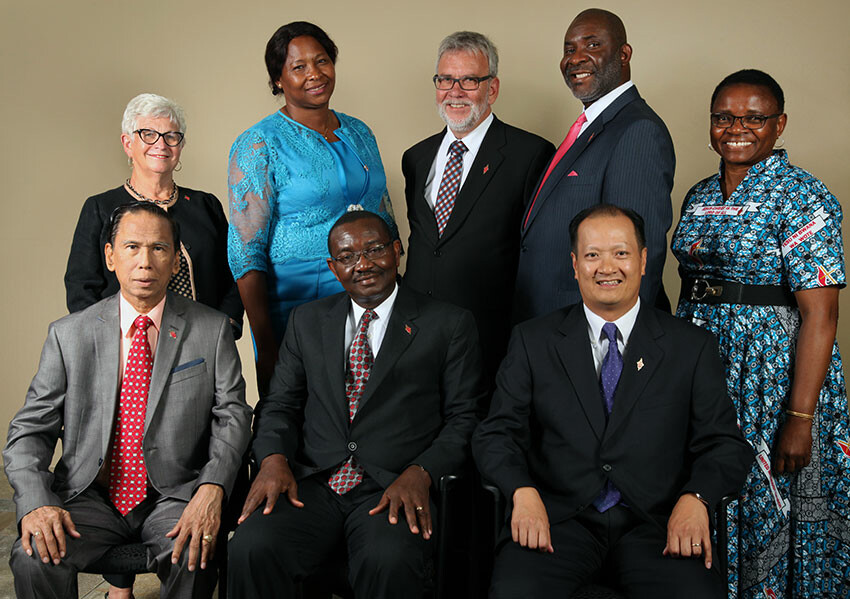Review all clergy qualifications, court says

Members of the 2016-2020 Judicial Council. (From left) Front row: Deanell Reece Tacha, N. Oswald Tweh Sr., the Rev. Luan-Vu Tran. Back row: Lydia Romão Gulele, Ruben T. Reyes, the Rev.Øyvind Helliesen, the Rev. Dennis Blackwell, and the Rev. J. Kabamba Kiboko. Photo by Kathleen Barry, United Methodist Communications.
By Linda Bloom, UMNS
United Methodist boards of ordained ministry must look at all qualifications to determine whether a ministerial candidate is a fitting applicant — including adherence to the church’s position on homosexuality.
That is the ruling of the Judicial Council, the denomination’s top court, in petitions related to the New York and Northern Illinois conferences, where those boards had publicly declared they would not consider issues of sexuality when evaluating a candidate.
In total, the nine-member Judicial Council deliberated on seven docket items during its April 25-28 spring session, including a petition challenging last year’s election of a lesbian bishop, Bishop Karen Oliveto, that drew attention from church members worldwide. About 200 people attended an April 25 oral hearing on the matter.
In that case, the court ruled that the consecration of a gay bishop violates church law, but said the bishop “remains in good standing” until an administrative or judicial process is completed.
One of the qualifications for candidacy and ordained ministry in The United Methodist Church — as stated in church law — is “fidelity in marriage and celibacy in singleness.”
“The board of ordained ministry is mandated by the Book of Discipline 2012 to examine all applicants as to their fitness for the ordained ministry…,” the council declared in both Decision 1343 regarding a New York Conference bishop’s decision of law, and Decision 1344, related to a bishop’s decision of law in Northern Illinois.
This “full inquiry” of candidates in the categories of
“Candidates for licensed and ordained ministry seeking election into The United Methodist Church should be treated fairly and denial of entry must be based upon the evidence received from the results of the full examination,” the decisions said.
The New York decision is the continuation of a petition on a bishop’s decision of law that was on the council’s October 2016 docket. Decision 1343 modifies the ruling the court received from Bishop Jane Allen Middleton, now retired, on two questions raised during
Paragraph 304.3 in the Book of Discipline, which prohibits self-avowed practicing homosexuals from being “certified as candidates, ordained as ministers or appointed to serve in the Methodist Church,” prevents a board of ordained ministry “from ignoring statements of self-disclosure,” the decision said.
The Northern Illinois decision, which modified a decision of law by Bishop Sally Dyck, stressed the duty of the board of ordained ministry “to conduct a careful and thorough examination and investigation, not only in terms of depth but also
Only after a thorough examination can a person who has met “the disciplinary standards for fitness” be recommended to a conference’s clergy session as a candidate for the ministry, Judicial Council said.
In other rulings on the spring docket, Judicial Council affirmed a bishop’s decision of law from the 2016 Northeastern Jurisdictional Conference in Lancaster, Pennsylvania.
A “Stop the Trials” resolution — calling for the jurisdiction’s college of bishops to stop church trials — was debated, amended and “untitled” before being approved by delegates on July 14.
The court agreed with Bishop Mark J. Webb, who ruled the resolution to be “null, void and of no effect.”
“Jurisdictional conferences are free to adopt resolutions that are aspirational in
“They may not pass resolutions that encourage a violation of church law or discourage the enforcement of church law.”
The council found the “untitled resolution” adopted by the Northeastern Jurisdictional Conference to be “contrary to the Constitution and The Discipline, and, therefore, null and void.”
Bloom is the assistant news editor for United Methodist News Service and is based in New York. Follow her at https://twitter.com/umcscribe or contact her at 615-742-5470 or . To read more United Methodist news, subscribe to the free Daily or Weekly Digests.
